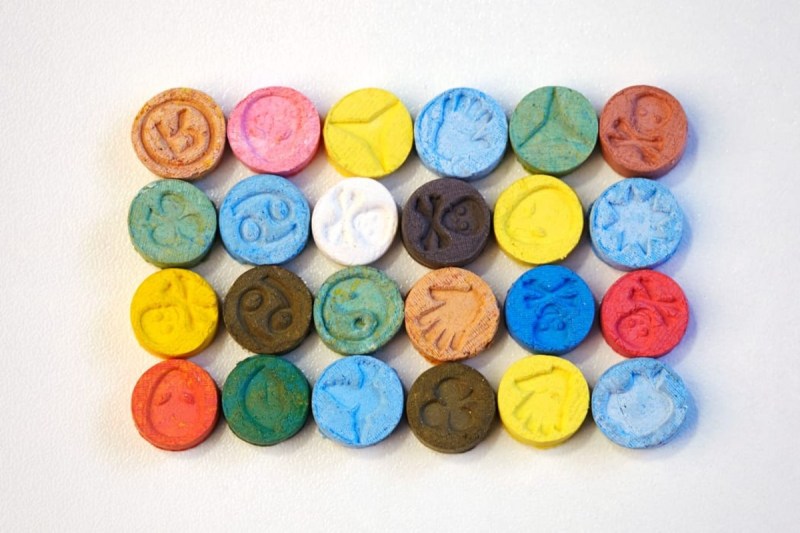These days, while psychedelic therapy in general is a hot topic, MDMA-assisted psychotherapy is a particularly prominent talking point; it’s leading the way in terms of potential legalization, at least in a therapeutic context. Once almost unanimously considered a mere party drug — and wrongly, a deadly one at that — this powerful substance has undergone a radical reappraisal.
What is MDMA, though? What does the research show about its therapeutic benefits? What’s it like to actually take the stuff? Let’s take a look at all of this and more.

What is MDMA?
MDMA is an abbreviation of 3,4-Methylenedioxymethamphetamine. Known more commonly under the street names “ecstasy” or “molly,” the drug was originally synthesized more than 100 years ago but was quickly disregarded. While it floated in and out of research circles (and briefly, recreational circles as well), it wasn’t until the 1970s that some began to consider MDMA for therapeutic purposes. By the 1980s it was becoming increasingly popular in the club scene, and in 1985 — deep into the days of Nancy Reagan’s “Just Say No” madness — it was officially banned. For the next 20 years, it existed almost solely underground, much maligned by the media for its role in the rave scene.
Ravers liked MDMA because, in a nutshell, it makes you feel amazing both physically and mentally. Music feels more, well … it feels more. It also generally makes users feel a sense of love and harmony for those around them. This is why contemporary proponents often refer to it as an “empathogen.”

What are the benefits of MDMA?
There is substantial research to support the use of MDMA for therapy.
Amy Emerson is the CEO of the Multidisciplinary Association for Psychedelic Studies, the most prominent psychedelic research and advocacy group known more commonly as MAPS. According to her, “In a Phase 3 clinical study, 88% of the participants with PTSD experienced a reduction in their symptoms, and two-thirds of the participants no longer qualified for a PTSD diagnosis. These participants were individuals who had had PTSD for 14 years on average.”
Compare that against Zoloft, the most common legal drug for PTSD treatment, which reduces symptoms in only 53% of patients. In other words, MDMA helps nearly all PTSD patients while the most popular current medication is a coin toss.
What’s more, that two-thirds ratio Emerson mentioned is important. That means that these people were, for all practical purposes, cured of PTSD. Again, compare that to Zoloft, which is not intended to cure PSTD but simply manage the symptoms on a continual basis.
These results have been reverified by numerous different studies, which has caused the FDA to fast-track the drug for approval. Says Emerson, “We anticipate that the new drug application will be submitted to the FDA for review in the third quarter of this year.”
Suffice to say that MDMA therapy for PTSD might be coming to a clinic near you sooner rather than later.
The benefits don’t stop there. Research has strongly indicated that MDMA can be used to treat anxiety, depression, and addiction, and proponents say that it could revolutionize couples therapy.

What is MDMA like?
Simply put, MDMA makes you feel fantastic. There’s a reason it’s long been called “ecstasy.” Let’s get more specific, however, and describe the entire MDMA experience.
Typically, MDMA is ingested either as a pill or a powder, and it takes 30–40 minutes to kick in. It kind of creeps up on you. One minute you feel as usual, and the next you simply feel … better. The world around you begins to look a bit blurry and soft. Your thought processes tend to feel more open and enjoyable.
According to MAPS, these effects can be described by:
- A reduction in fear and defensiveness
- A heightened sense of wellbeing
- Increases in sociability, extroversion, and interpersonal trust
Depending on dosage, these feelings can last anywhere from 2–4 hours with a “peak” somewhere around 90 minutes when the effects are strongest. Throughout the experience, you’ll typically feel warm and physically pleasant.
While MDMA is often described as a psychedelic, it’s different from the classic psychedelics chemically as well as in terms of the effects. The most blatant difference involves hallucinations or “visuals.” With psychedelics like DMT, LSD, or mushrooms, you’ll frequently experience powerful, reality-changing visual changes. This isn’t the case with MDMA. Things might appear blurry, and you might see tracers following lights when you or they move, but beyond that, you’re unlikely to see actual hallucinations.

MDMA for therapy
In a therapeutic context, the aforementioned effects help the patient feel more open to confronting difficult thoughts or memories. It enables them to empathize with themselves and others involved in their psychological scenario.
Models for successful MDMA therapy are still being developed, but the program MAPS has been studying includes three eight-hour drug sessions scheduled roughly one month apart, with 12 non-drug therapy sessions woven in to help with preparation and integration.
“Integration” is increasingly thought to be an essential part of psychedelic therapy. As the name suggests, this is the process of integrating your drug experience into your day-to-day life. Typically, it involves speaking with a therapist, but it can also include journaling, writing a letter to oneself or a loved one, creating art, and so on.
As the stats imply, this process can be highly effective, driving positive results in nearly nine out of 10 patients.
Are there any risks to MDMA?
Most of the research-verified risks are short term, including nausea, grinding teeth, blurred vision, chills, and sweating. While drug war propaganda has trumped up a range of dramatic long-term risks, there isn’t much science to support the oft-asserted risk of brain damage. Some studies have shown that frequent use over the long term can negatively impact cognition, but more studies are needed.
According to Emerson, “In the Phase 3 clinical trials, there were no serious adverse events observed for those who received MDMA-assisted therapy.”
In any case, extreme adverse reactions are extremely unlikely in a therapeutic setting. The two biggest verifiable risks associated with MDMA are behavioral dangers that loom in recreational spaces.
First, MDMA famously facilitates interpersonal connection while making physical sensations highly pleasurable. For these reasons, risky sexual behaviors may increase. Second, it makes dancing more enjoyable while increasing perspiration. This, coupled with hot, crowded dance floors, can result in dehydration or hyperthermia. For these reasons, when taking MDMA recreationally, be sure to be around people you trust, always drink plenty of water, and take frequent dance breaks.
Generally speaking, research is increasingly establishing that MDMA is safe, particularly when used in a controlled space. So when it gets approved for therapeutic use — which will happen, and soon — don’t let outdated Reaganite propaganda dissuade you.
Therapy has never been so enjoyable and effective.




